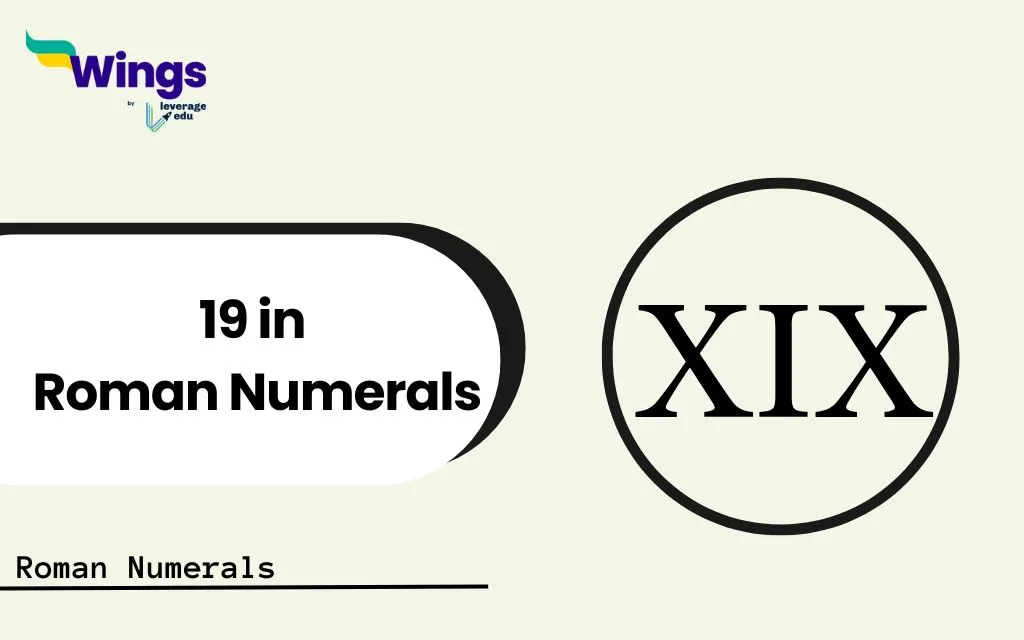Writing 19 in roman numerals is simple as long as you know the basics about this topic. Similarly, in case of the numbers, the roman numberl for 19 will be XIX. To give you a background about this topic, roman numerals are a numeral system that originated in ancient Rome and remained the usual way of writing numbers throughout Europe well into the Late Middle Ages. Numbers are written with combinations of letters from the Latin alphabet, each with a fixed integer value. Keep reading this blog to find the detailed method of how to write 19 in roman numerals.
Contents
How to Write 19 in Roman Numerals?
To write 19 in Roman numerals, we break it down into its component parts:
- 10: This is represented by the Roman numeral X.
- 9: This is a bit trickier. In Roman numerals, we use subtraction to represent numbers that are one less than a multiple of five or ten. So, to represent 9, we subtract 1 from 10. This is written as IX.
Now, we combine these two: X + IX = XIX
| Number | Roman Numeral |
| 19 | XIX |
Also Read: Roman Numerals 1 to 1000
How to Convert XIX to Number?
To convert XIX from roman numerals to the mathematical number, you need to understand the basic Roman numerals and their values:
| Roman Numeral | Mathematical Number |
| I | 1 |
| V | 5 |
| X | 10 |
| L | 50 |
| C | 100 |
| D | 500 |
| M | 1000 |
Now, let’s break down XIX:
- X = 10
- IX = 9 (Here, I is subtracted from X, so 10 – 1 = 9)
Combining these values, we get: 10 + 9 = 19
Therefore, XIX in Roman numerals is equivalent to the number 19.
Also Read: How to Write 18 in Roman Numerals? 18 is XVIII
Exercise on 19 in Roman Numerals
Now that you have understood all about how to write 19 in Roman numerals, it is time to practice some questions which we have prepared for you.
Multiple Choice Questions
- What is the Roman numeral for 19?
- a) XIX
- b) IXI
- c) IVIV
- d) XXI
- Which of the following is NOT a correct representation of a number using Roman numerals?
- a) IV
- b) IX
- c) VIIII
- d) XIX
- How many Roman numerals are used to represent 19?
- a) 1
- b) 2
- c) 3
- d) 4
Fill in the Blanks
- The Roman numeral for 10 is _____.
- To represent 9 in Roman numerals, we use _____.
- Combining 10 and 9 in Roman numerals gives us _____.
True or False
- The Roman numeral for 19 can be written as IIXVII.
- The Roman numeral XIX represents a number less than 20.
Write the Roman Numerals
- 12
- 25
- 39
Convert to Hindu-Arabic Numerals
- XIV
- XXVII
- XLII
Check Answers:
Multiple Choice Questions
- a) XIX
- c) VIIII (Roman numerals cannot be repeated more than three times)
- c) 3 (X and IX)
Fill in the Blanks
- X
- IX
- XIX
True or False
- False
- True
Write the Roman Numerals
- XII
- XXV
- XXXIX
Convert to Hindu-Arabic Numerals
- 14
- 27
- 42
Also Read: How to Write 100 in Roman Numerals?
FAQs
19 is written as XIX in Roman numerals.
In Roman numerals, we use subtraction for certain numbers. To represent 9, we subtract 1 from 10 (X – I = IX). So, for 19, we add 10 (X) and 9 (IX) together: X + IX = XIX.
The basic Roman numerals are:
I = 1;
V = 5;
X = 10;
L = 50 ;
C = 100;
D = 500;
M = 1000
Yes, there are a few rules: – Smaller numerals before larger ones indicate subtraction (e.g., IV = 5 – 1 = 4). – Smaller numerals after larger ones indicate addition (e.g., VI = 5 + 1 = 6). – The same numeral cannot be repeated more than three times in a row.
While not as common as Arabic numerals, Roman numerals are still used in various contexts: – Clock faces – Outlines in books and documents – Naming rulers or popes (e.g., King George VI, Pope John Paul II) – Copyright dates on movies – Super Bowl numbers
This blog was all about ‘19 in Roman Numerals’. We hope we provided you with all the necessary information. For more blogs on school education, follow Leverage Edu now.


 One app for all your study abroad needs
One app for all your study abroad needs












 60,000+ students trusted us with their dreams. Take the first step today!
60,000+ students trusted us with their dreams. Take the first step today!